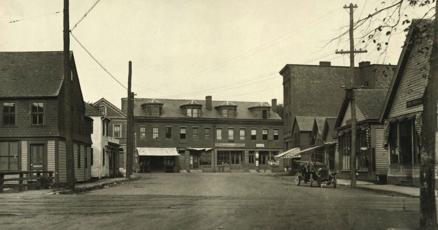In South County, just like the rest of the nation, there was a palpable sense of anticipation as the first decade of the 20th century drew to a close, signaling the dawn of the Age of the Automobile. The community was eagerly awaiting the moment when this new era would kick off, transforming not just their way of life, but the entire world as they knew it.
The concept of having a “car in every driveway” was not merely a game-changing idea; it was a revolutionary one that promised to alter the course of history permanently. Every facet of life in South County stood on the brink of transformation; from the bustling high society scene at the Narragansett Pier to the industrial hubs in Peacedale, Lafayette, and Westerly, from the quaint coastal villages like Wickford, Galilee, and Saunderstown to the idyllic farming communities in Exeter, Richmond, and Hopkinton—every corner of South County was about to be swept up in the unstoppable tide of progress heralded by the advent of the automobile.
At the turn of the century, automobiles were more of a novelty, a symbol of status reserved for the elite class. In 1904, when Rhode Island issued its first license plates, notable figures like Dr. Rowland Robinson of Wakefield and Joshua C. Tucker, owner of the Narragansett Pier Company, were among the privileged few to receive them. However, it was not until the mass production of the Ford Model T in 1909 that automobiles transitioned from luxury items to everyday necessities, propelling South County and the nation into a rapid evolution towards the future.
The impact of this automotive revolution was swift and far-reaching. Traditional modes of transportation such as light rail and horse-drawn carriages quickly became obsolete, unable to keep pace with the rapid expansion of automobiles. Roads and bridges designed for horse-drawn vehicles struggled to accommodate the influx of cars, leading to a surge in demand for parking and necessitating infrastructural changes across South County. Water-based transportation also felt the effects of this revolution, with passenger travel declining as cargo trucks became the new norm for freight transportation.
The introduction of automobiles not only reshaped transportation systems but also had profound social implications. While it offered newfound freedom and opportunities to individuals, it also eroded traditional community ties and values that had long defined South County. The ease of travel allowed people to venture beyond their familiar surroundings, leading to shifts in social dynamics and romantic relationships within the community.
As families gathered in front of Mother Prentice’s renowned Wickford House at the end of the first decade of the 20th century, little did they realize the tumultuous journey that awaited them in the Age of the Automobile. The upcoming 31st Annual RI Statewide Historic Preservation Conference on April 30th promises a deep dive into the rich history of South County, particularly in the quaint and historic town of Wickford. Enthusiasts of local stories and heritage are encouraged to join this immersive event to explore the region’s Swamp Yankee legacy. Secure your spot today at [conference website]. I look forward to attending, and I hope to see you there as well.
